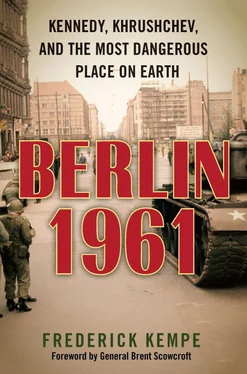Kosygin then asked Kroll for permission to raise his own toast, which the ambassador granted. “You are for us the ambassador for all the Germans,” he said, reflecting Khrushchev’s own view that the Soviet Union would be far better off if it had been the West Germans, with all of their resources, who had become their allies, rather than the burdensome East Germans with their constant economic demands and substandard goods.
Khrushchev then laced this seduction with a threat. “The German problem must be solved in 1961,” he told Kroll. The Soviet leader said he had lost his patience with the U.S. refusal to negotiate a change to Berlin’s status in a manner that would allow him to stop the refugee flow and sign a war-ending peace treaty with East Germany. Mikoyan told Kroll that “certain circles” in Moscow were increasing their pressure on Khrushchev to the point that the Soviet leader could not resist their demands much longer to act on Berlin.
Kroll assumed Mikoyan was referring to what had become known within Soviet party circles as the “Ulbricht lobby,” a group that had been greatly influenced by the East German leader’s increasingly strident complaints that Khrushchev was not defending Germany’s socialist state with sufficient vigor.
Made more agreeable by all the Soviet compliments and champagne, Kroll conceded that the Soviet leader had demonstrated remarkable patience over Berlin. He warned Khrushchev, however, that if the Soviets unilaterally upset the Berlin status quo, the result would be an international crisis, and perhaps even military conflict with the U.S. and the West.
Khrushchev disagreed. He shrugged that the West would respond with “a short period of excitement” that would quickly recede. “No one in the world will declare war over Berlin or the German question,” he told Kroll. Khrushchev, knowing Kroll would report the conversation to the Americans and his superiors, said he would prefer a negotiated agreement to taking unilateral action, but he stressed, “That will depend on Kennedy.”
At four in the morning, Khrushchev ended the meeting and then paraded Kroll, Kosygin, and Mikoyan through the still-dancing crowd, which paused and opened an aisle for them to walk through.
Even as experienced an ambassador as Kroll never knew which of Khrushchev’s frequent threats to take seriously. Yet the manner in which Khrushchev had raised the Berlin issue that evening convinced him that the year ahead would bring a confrontation over the matter. He would relay that view to Adenauer—and through him to the Americans. It was clear to Kroll that Khrushchev had concluded that the risks of inaction were growing greater than the dangers of action.
However, the way the year would play out—cooperation or confrontation—would depend on the dilemma that lay at the heart of Khrushchev’s thinking on Berlin.
On the one hand, Khrushchev remained certain that he could not afford a military competition or war with the Americans. He was committed to negotiating a peaceful coexistence with the U.S. and was reaching out to the new American president in hopes of brokering a Berlin deal.
On the other hand, Khrushchev’s meeting with West German Ambassador Kroll demonstrated the growing pressure on him to solve his Berlin problem before it became a larger threat, both to the Soviet empire and, more immediately, to his own leadership.
For that reason, Khrushchev was a communist in a hurry.
And that was not his only Berlin problem. The Berliners themselves despised him, resented Soviet soldiers, and were weary of their occupation. Their memories of the postwar period were only bad ones….
Marta Hillers’s Story of Rape
SOMEWHERE IN SWITZERLAND
JANUARY 1961
Marta Hillers’s only consolation was that she had refused to put her name on the extraordinary manuscript in which she had so meticulously recounted the Soviet conquest of Berlin during the cold spring of 1945. It had been a time when her life—like that of tens of thousands of other Berlin women and girls—had become a nightmare of fear, hunger, and rape.
Published for the first time in German in 1959, the book had brought to life one of the worst military atrocities ever. According to estimates extracted from hospital records, between 90,000 and 130,000 Berlin women had been raped during the last days of the war and the first days of Soviet occupation. Tens of thousands of others had fallen victim elsewhere in the Soviet zone.
Hillers had expected the book to be welcomed by a people who wanted the world to know that they, too, had been the victims of war. However, Berliners had responded with either hostility or silence. The world still felt little sympathy for any pain inflicted on a German people who had brought the world so much suffering. Berlin women who had lived through the humiliation had no desire to recall it. And Berlin men found it too painful to be reminded of their failure to protect their wives and daughters. Early 1961 was a time of complacency and amnesia in Soviet-dominated East Germany and East Berlin, and there seemed little reason to get worked up about a history that no one had the power to change or the stomach to digest.
Perhaps the German response should have been no surprise to Hillers, given the shame she herself expressed in signing her memoirs, Eine Frau in Berlin (A Woman in Berlin), only as “Anonyma.” She’d published them only after marrying and safely moving to Switzerland. The book had not circulated or been reviewed in East Germany, and only a few copies had been smuggled across to the communist zone in suitcases stuffed full of Western fashion magazines and other more escapist literature. In West Berlin, Anonyma’s memoirs sold poorly, and reviews accused her either of anticommunist propaganda or of besmirching the honor of German women—something she would insist that Soviet soldiers had done just fine long before her.
One such review, buried of West Berlin’s Tagesspiegel, bore the headline: A DISSERVICE TO BERLIN WOMEN / BEST-SELLER ABROAD—A FALSIFIED SPECIAL CASE. What irritated the reviewer, who accused the author of “shameless immorality,” was the book’s uncompromising narrative that so richly captured the cynicism of the postwar months. Judgments like that of Der Tagesspiegel prompted Hillers to remain underground and to prohibit any new editions of the book from being published during her lifetime, which ended at age ninety in 2001.
She would never know that, following her death, her book would be re-published and become a best-seller in several languages, including the German edition in 2003. Nor would she ever have the satisfaction of knowing her story would be made into a major German movie in 2008 and become a favorite of feminists everywhere.
Back in 1961, Hillers was more concerned with dodging the reporters who were trying to hunt her down from the few clues in her published pages. The book revealed that she was a journalist in her thirties, had lived in the Tempelhof district, had spent sufficient time in the Soviet Union to speak some Russian, and was “a pale-faced blonde always dressed in the same winter coat.” None of that had been enough to identify her.
Still, nothing better captured the German attitude of the time toward their occupiers than the substance of Hillers’s book and Berliners’ aversion to reading it. The East German relationship to their Soviet military occupiers, who still numbered 400,000 to 500,000 by 1961, was a mixture of pity and dread, complacency, and amnesia. Most East Germans had grown resigned to their seemingly permanent cohabitation. Among those who hadn’t, many had fled as refugees.
Читать дальше











